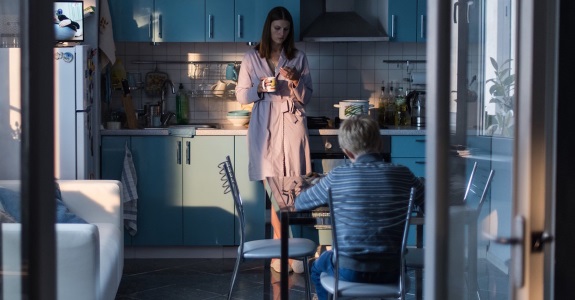Seán McGovern on Russia's Foreign Film Oscar nominee opening tomorrow in select US cities

There's a moment in Andrey Zvyagintsev's masterful film Loveless when a volunteer search and rescue venture into the forest to look for missing boy, Alexey. Tipped-off by the boy's classmate, the team, flanked in their fluorescent jackets, comb over every inch of a massive, abandoned building in the forest. Fixtures and furniture are freezing and rotting in the building. Art deco detailing crumbling around them. Burst pipes, detritus. No sign of life. As I was watching I kept asking what this building was. Why was it built? When? Was it still here? These questions were not even addressed, let alone any kind of answer. And this is Loveless: A fog of cold indifference shrouds these characters and their world of empty-hearted progress. This is a film about loss, and not only the loss of a child...
Zhenya and Boris are divorcing. Boris is gearing up for fatherhood once again with young, expectant Masha. Zhenya is ditching her schlubby husband for the older, sophisticated Anton. There's only one thing standing in the way of their new lives: their son.
"Boarding school and the army," says Zhenya. After all, "he likes summer camp." But while lost in their reveries of the lives the intend to lead, neither notices that their child has been missing for two days. And how would they? Zhenya scrolls aspirationally through Instagram while her son sheds silent tears at the breakfast table. Boris is reluctant to come home early from work when he hears the news. And while the two are forced together to track down their boy, it all feels like a protracted inconvenience.
In his last feature, Leviathan (which also garnered a Best Foreign Language Oscar nomination), Zvyagintsev drew ire from the state for presenting a critical view of Russia, one they felt unrepresentative of the society they claimed to know. And while Loveless is not overtly political, it is damning of Russia's empty-hearted progress.
Loveless has the potential to be the bleakest of social commentaries, with characters more morally bankrupt than anything Dostoyevsky could dream up. And while there is no Hollywood ending in sight, no thaw between the parents: the misery is brisk. We don't learn to hate Boris and Zhenya so much as vow to never be like them. Zvyagintsev's bleakness is oddly heartening. I was lucky enough to see him speak about Loveless recently at the British Film Institute, where he said that because he had a childhood full of such love, he became fascinated with characters who suffered an absence of it.

When the search and rescue team ask Zhenya to drive three hours to her mother's home to see if Alexey is there, we meet the larger and louder than life babooshka who is far better at articulating her disdain for her offspring. Zhenya is pickled with hate because her entire existence had been an inconvenience. In Putin's Russia, with the emboldened Russian Orthodox Church keeping the traditional family in check, it's no wonder warmth never came naturally to Zhenya.
Zvyagintsev is an important voice in world cinema today. We are inundated daily with rightful warnings of Russian interference. But in this vast nation there are still dissenting voices, cautiously damning the state-sponsored oppression so well that, in a few weeks, Zvyagintsev may be holding an Oscar for his efforts.
Overall: Brave the sorrow and find a way to see this powerful and necessary film. Empathy is international. A
Oscar chances: This is truly stunning work but it's starkness may not appeal to Oscar voters.